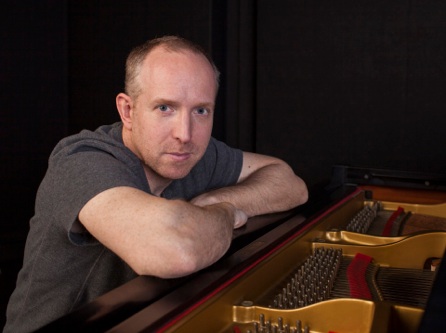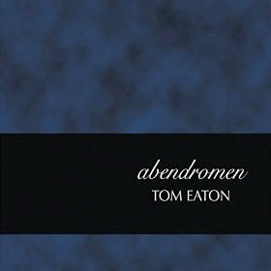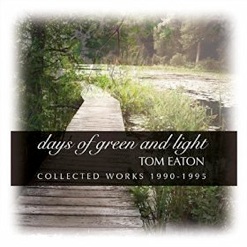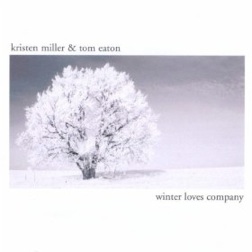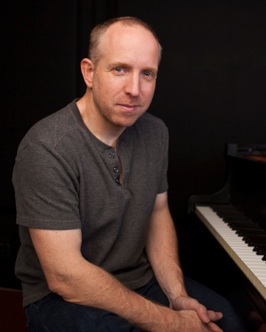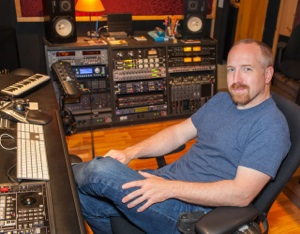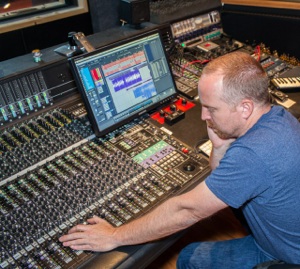Anyone who has been following the large output of music coming from Imaginary Road Studio in Vermont since 2010 has at least seen the name Tom Eaton. Tom has been the Chief Engineer for the studio, working closely with Will Ackerman (founder of Windham Hill Records), and often playing an interesting variety of instruments on many artists’ recordings; he is often credited with co-producing albums as well. I knew Tom Eaton was a man of many hats, but I was still surprised when he contacted me earlier this year to review his own album,
Abendromen. I was anxious to hear who Tom was as a composer and musician, and was surprised to discover that the album was mostly electronic with piano, keyboards, guitars, basses and percussion all played by Tom himself. I wasn’t surprised by how much I liked the album and made it a recent “Pick” on MainlyPiano.com. I was also pleased to find out that Tom was willing to do an interview for MainlyPiano, so here it is!
KP: Hi Tom! Thanks for taking the time to chat! It sounds like you are one of the busiest people in the music industry.
TE: It's possible. I am very fortunate to work with Will who continues to draw incredibly talented people to Vermont to make amazing records with us. I have a dream job!
KP: And you do it so well! You do so many different things within the industry, but front and center right now is your new album, Abendromen. What is the meaning of the title and how does it relate to the music you have created?
TE: Abendromen as a word is the creation of my friend, artist Marco Badot. These songs came from night time sessions, overnight in some cases. They were my way of processing a difficult emotional experience I was going through, and I asked Marco to help me come up with a title for them that was slightly inscrutable, something that touched on lucid dreaming, evening skies, and my own Dutch heritage. He started putting words in front of me, and then this concept of "seven evening dreams" emerged: a dream for each evening of the week. The first part of the title is actually German, “Abend" means evening, and “Dromen" is Dutch for dreams.
KP: This is not your first album of original material, but it has been a long time since the last one. When did you release your previous albums?
TE: I put out a very limited release album in 1990 or so, and then in 2010 I split a cd with my good friend, cellist Kristen Miller. That was a holiday record, called Winter Loves Company. (A little play on "misery loves company" as neither of us were particularly enjoying the winter we were having.) I've recently released a download-only compilation of some of my electronica from the early-90s, called Days of Green and Light, and there are two more albums in the works. One is a current electronic album (Redemption) and there are a couple of songs from that on Soundcloud. The other is a second volume of Abendromen. I'm still very much in that zone and most of that record is already written.
KP: Will Volume 2 be another evening dream for each day of the week or are you going in a different direction with the concept?
TE: Seven more dreams, yes... these may go deeper into the night. Also there will be some guests artists!
KP: Since each track is named for a specific evening of the week, how did you match the music with a specific day/evening?
TE: The songs seemed to want to align the way they did, and fit the days nicely. I can relate each piece to its day quite easily.... it makes perfect sense to me.
KP: The overall feel of the album is a little on the dark side, but is far from gloomy. Introspective is probably more accurate. Did the music come before or after the concept of the album?
TE: Well, the music WAS me evening dreaming, sometimes trading music time for sleep. So the concept was there from the first note. The first piece that emerged (Monday) was titled "Midwinter" from the start, and then other melodies started to arrive and surround it. I wrote nine pieces, one will be on Abendromen II with Jeff Oster playing the melody, the other got shelved. The seven survivors seemed to be happy together.
KP: You have said that the whole album was completed in about four weeks. Do you often have creative “outbursts” like that where the music just keeps flowing?
TE: Not ever. I have never allowed myself that kind of deep immersion in a work. And when I have found moments to work on single songs I always seem to lose the moment, lose the thread that would have led me on. So I have a lot of orphaned pieces. This is of course tied to your very first point. I am a super busy guy and carving out time for my own work is difficult.
KP: Were your previous albums also a mix of piano and electronic instruments?
TE: My pieces on Winter Loves Company were piano and some electronics; Days of Green and Light, all synths. Redemption has some more guitar on it (electric and classical).
KP: Abendromen includes three bonus tracks. Tell us about them.
TE: The "landscape" of a song to me is very important, the place the melody emerges from. Sometimes I'll create looping guitar environments (ideas that circle continuously) as backdrops for songs, to help me feel like I can be simpler with the melody. The bonus tracks are guitar loops that I made in the process of making the record. I was surprised how much I liked letting the loops swirl around me, and figured it was my record and I could put them on there if I wanted to. So I did. At the end of the last loop (track 10) a bit of backwards piano shows up and that was my son, Huck's, idea. I was rewinding over a section of the record and he said "that sounds cool!” So I found a spot to work it in. I ended up loving it there, but take no credit for the idea!
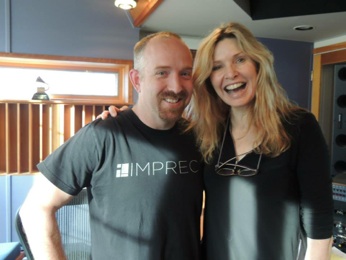
Tom with Fiona Joy at Imaginary Road Studio.
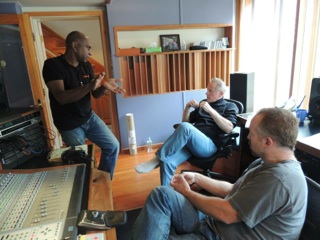
From left: Jeff Haynes, Will Ackerman, and Tom.
KP: You have been the Chief Engineer at Imaginary Road Studios since 2010, working very closely with Will Ackerman. How did you get that gig?
TE: Will placed an advertisement in on an online bulletin board looking for a sub for a weeklong session. I had just moved my own studio, and was finishing up the construction, but wrote to him explaining who I was and that I would love to meet him and see if I could be helpful. I had been recording acoustic folk music commercially for years and my own instrumental stuff, and I am a huge Windham Hill fan, so it made perfect sense. Of course after that week at Imaginary Road, Will asked me to stay on - which I agreed to do. If I had known he was looking for someone for more than a week I never would have written to him, having just moved and built my own new studio! By now we've done more than 50 records together!
KP: Funny how life works sometimes! In addition to engineering, co-producing, mixing, and mastering the albums that are recorded at Imaginary Road, you often play a variety of instruments on the albums. How many instruments do you play?
TE: I can make noises on a bunch of things. Whether those noises are music is a matter of personal taste. I'm most comfortable interfacing with piano keyboards - so piano, synths, accordion, those are my most fluent zones. I've played bass for years, never very well, but I really enjoy it. Fretless is new to me, and the one I play on Abendromen was a gift from Tony Levin. Electric guitar is newer for me, but I love the textural opportunities it presents, as well as the fluidity of the strings. I play some percussion, too. I've played autoharp, ocarina, singing bowls, all kinds of things. If the record in front of me requires or suggests a sound that I might be able to make, I'll go for it.
KP: How do you decide which instruments to add to an artist’s recording? Is it something you intuit or is it more the artist’s idea of what the music should sound like? It’s probably a combination of the two, but I’ve been curious about that.
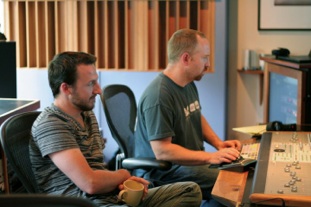
With Todd Boston
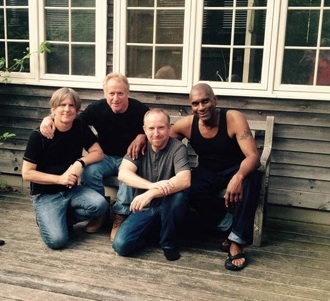
Todd Mosby, Will Ackerman, Tom, and Jeff Haynes.
TE: At Imaginary Road, that is Will's department, although frequently by this point, he and I hear the same thing in our heads as the first tracks are being put down. Intuit is the right word - being open to what the music seems to be asking for. Sometimes Will and I will just look at each other and and say "Gus!" (Gus Sebring, French horn for BSO) at the same time; other times one or the other of us has an idea we float to the other. Will is so good at letting the music steer itself. Will, of course, outranks me for final say, and then the artist outranks us both! We'll argue our points of view, but at the end of the day, the records express the artist's vision, and we act as facilitators to make the best art for each individual artist using whatever means necessary!
KP: I understand that you have done a lot of work in recording acoustic folk music. That seems so different from your own electronic music and what you are doing at Imaginary Road. I would imagine that so much diversity in the music would help to keep all of it fresh. Is that the case?
TE: Absolutely! I love the variety. I'll happily go from tracking drums at my place to working on synth stuff or making crazy audiophile recordings of Eugene Friesen or the amazing Steinway at Imaginary Road. I do sessions for Fractal Audio that are ALL about distorted guitars. Love that too!
KP: Okay, let’s back up a bit and find out more about you. Where were you born and where did you grow up?
TE: Born 1971, about 20 miles from Newburyport, MA, where I am now. Just over the border in New Hampshire. Grew up in a tiny town called Newton Junction, NH. At least until my parents decided that I needed a better school and I got shipped out! I swear it wasn't behavior related.
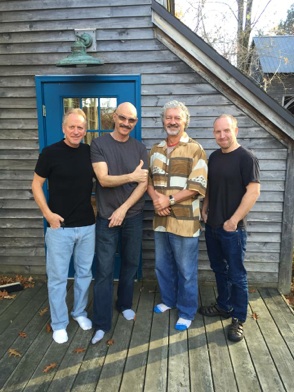
From left: Will Ackerman, Tony Levin, Louis Colaiannia, and Tom outside Imaginary Road Studio.
KP: (laughing) Uh huh! You cite your father as being an early influence since he had music playing all the time and was known to bring some of his record collection to your school to share with your classmates. What kinds of music did he play at home and in your classrooms?
TE: My dad would come to our elementary school once a year and play examples of early rock and roll. He was a history teacher, and is a high end antique dealer. He has a love of the old, the transitional, the classic forms and how they are reinterpreted over time. So we would file down the halls into our little library (he must have brought his stereo from the house) and he'd play Buddy Holly, The Beatles, Fats Domino, the Big Bopper, Coasters, and on and on. I used to travel around with him as he made his rounds looking for furniture. I remember learning to keep a beat by tapping along on the dashboard of his van.
KP: Is or was he a musician himself?
TE: Nope.
KP: Are any of your other family members musicians?
TE: My mom sings in her church choir and has been part of many choral groups over the years.
KP: What was your first musical instrument and when did you start playing it?
TE: The Eb alto sax! In fourth grade. I was horrible!
KP: Do you have formal music training?
TE: Very little. I studied synthesis quite a bit, and as an engineer and arranger that has helped a lot. I know enough theory to converse on the surface with the serious players that we get to work with, like knowing how to ask where the bathroom is when you're in a foreign country.
KP: Enough to get by! When did you start composing music?
TE: 1987. Phillips Andover electronic music lab. Then a year or so later I started playing a lot of piano, heavily influenced by some piano player named Winston.
KP: I wonder if there are any piano and keyboard players who haven’t been influenced in some way by George! When did you start gravitating toward electronic music?
TE: From the get-go. My older brother brought some Tangerine Dream records home from college and I just loved them. I ate it all up. Every TD, Jarre, Vangelis or Kitaro record I could get my hands on. The Private Music label had a huge influence on me, as did Hearts of Space. And right alongside these records were the Winston, Hedges, and Ackerman records!
KP: I collected a lot of Private Music albums, too, and was sad when they went away. When did you start collecting keyboards and how many did you collect? I know several musicians with very large guitar collections, and I’m sure that keyboards are similar in that some are really good at some things and not so good at others. A collection would give you a lot more choices.
TE: I started buying keyboards in 1988. Currently there are probably 40 synths or keyboard instruments kicking around here. Plus the virtual synths in the computer. Each has an identity, a thing it is good at - colors. Some are huge and warm, some crystalline. It takes a while to learn who is good at what, though!
KP: I’m sure! How old were you when you released your first album?
TE: 20, I guess. I haven’t done the math there! I'll be 45 in June.
KP: Ah, another June baby! When did you start recording other musicians?
TE: I opened my first commercial studio in 1993.
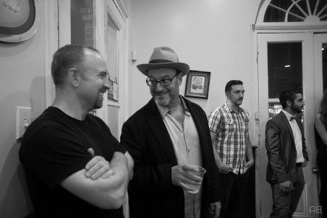
With Jeff Oster (center)
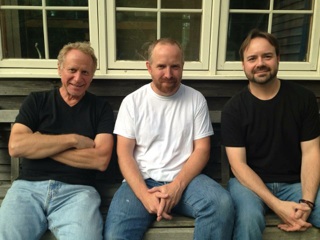
Will Ackerman, Tom, Vin Downes
KP: Who are some of your music influences?
TE: I love melancholy and texture. You can hear that in my music. My favorite albums are ones that have a sense of wholeness, a through line of emotion. Probably the music that has moved me the most in my life is that of Tim Story. Then the electronic pioneers, Tangerine Dream and Vangelis especially. Patrick O'Hearn, Jeff Pearce. I love introspective pop music, too: David Sylvian, Kate Bush, Genesis and Peter Gabriel, The Blue Nile. And of course the more acoustic side: I love Emmylou Harris, Greg Brown, Kate Rusby, Will's music, George Winston, Michael Hedges, Liz Story. Oh, Mark Knopfler is amazing!
KP: Do you have any favorite performers?
TE: I never make it to live events!
KP: You don’t have to - they all perform for you at work! I’ve gotten really spoiled, too, hosting so many house concerts. What a joy! Do you have any favorite composers?
TE: Tim Story!
KP: If you could have any three wishes, what would they be?
TE: I would spend the first two on each of my boys. Wishing that they each find a life as satisfying and meaningful as they need. My mantra has been "create work of lasting beauty" and through my work with Will, I get to help artists do that every day. I hope each of my guys can find a pathway to the kind of life I am able to live, where their daily work and practice is at one with their vision of how to make the world a better place.
I think I’ll keep my third wish to myself for now.
KP: Fair enough!
Many thanks to Tom Eaton for taking the time for this interview! For more information about Tom and his music, be sure to visit
his website and his
Artist Page here on MainlyPiano.com.
Kathy Parsons
March 2016

